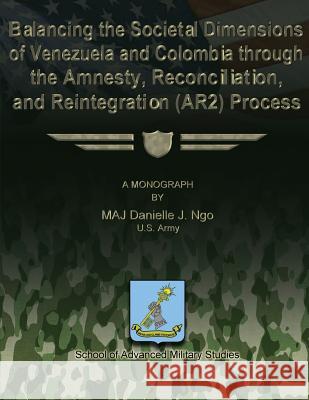Balancing the Societal Dimensions of Venezuela and Colombia through the Amnesty, Reconciliation, and Reintegration (AR2) Process » książka
Balancing the Societal Dimensions of Venezuela and Colombia through the Amnesty, Reconciliation, and Reintegration (AR2) Process
ISBN-13: 9781479200139 / Angielski / Miękka / 2012 / 52 str.
Balancing the Societal Dimensions of Venezuela and Colombia through the Amnesty, Reconciliation, and Reintegration (AR2) Process
ISBN-13: 9781479200139 / Angielski / Miękka / 2012 / 52 str.
(netto: 57,13 VAT: 5%)
Najniższa cena z 30 dni: 59,00
ok. 16-18 dni roboczych.
Darmowa dostawa!
This paper explains that in order for a fractured society to forge a lasting, stable peace, it requires not only a holistic approach to amnesty, reintegration, and reconciliation (AR2) but also a balance of three critical dimensions within its process: the political, security, and economic dimensions. It contends that if the process of AR2 is not complete or there is an imbalance in the system, the fractured society will either remain at an unstable peace, if contained, or move to crisis or possibly to war. On the surface, a government may seem successful in its quest at conflict resolution, but unless the problems underlying the societal fractures are balanced using the AR2 construct, stability will not endure. This study examines the societal dimensions of the AR2 process by using a case study methodology. Through the examination of two countries, Venezuela and Colombia, it tries to understand why two countries that have common ancestries and a similar history of authoritarian governments, economic stagnation, and social injustice follow different paths towards conflict resolution. It explores how a shift in the balance of the three dimensions can change the direction and effectiveness of the AR2 process. This author classifies both Venezuela and Colombia as societies in an unstable peace. Although Venezuela has become economically successful through the sales of its petroleum, economic wealth cannot solely stabilize a society. In order for Venezuela to secure a stable peace, it must balance its societal dimension by diversifying its economic base, continuing a politically open, democratic process, and addressing the concerns of its disenfranchised population. The AR2 process in Colombia has been a long and violent journey that has yet to be resolved. Colombia's instability mainly stems from the continuing insurgency within its country and the narco-trafficking cartel. Because of its duration, Colombia is undergoing its second phase of its AR2 process because the first phase has yet to balance the three societal dimensions of AR2. In order for Colombia to balance those dimensions, it must continue its current security strategy but not neglect the economic dimension and the poor of its country. It must also continue the paramilitary reintegration while addressing corruption and human rights offenses. Additionally, both systems cannot be analyzed in a vacuum. The fact that Colombia and Venezuela border one another and are economically dependent on one other has consequences to their AR2 process. It is a dynamic, complex system where a change to one dimension may affect the other dimensions in both countries in an unpredictable way. The study concludes that although both Venezuela and Colombia have made much progress towards the stabilization of their countries, the process is not complete. The imbalance in the dimensions of the AR2 process precludes them from achieving a lasting, stable peace. They must look to balancing the societal dimensions not only within their country but realize that actions taken within their dimensions also affects the balance of the dimensions in neighboring countries
Zawartość książki może nie spełniać oczekiwań – reklamacje nie obejmują treści, która mogła nie być redakcyjnie ani merytorycznie opracowana.











